选修八unit 2words
(完整版)人教版选修八第二单元词汇学习
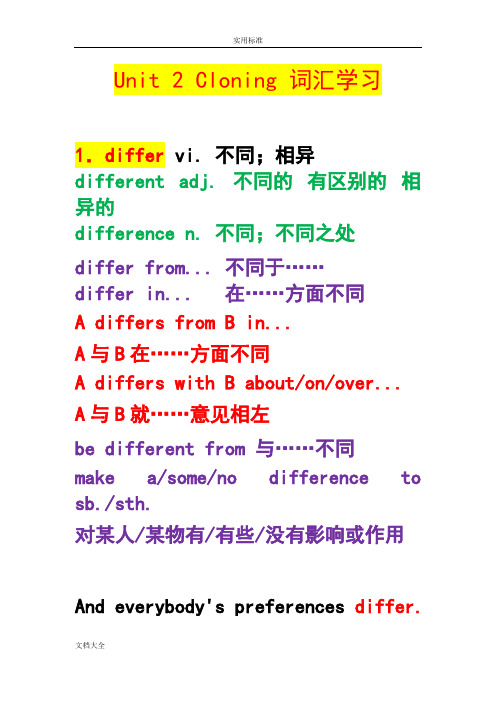
Unit 2 Cloning 词汇学习1.differ vi. 不同;相异different adj. 不同的有区别的相异的difference n. 不同;不同之处differ from... 不同于……differ in... 在……方面不同A differs fromB in...A与B在……方面不同A differs withB about/on/over... A与B就……意见相左be different from 与……不同make a/some/no difference to sb./sth.对某人/某物有/有些/没有影响或作用And everybody's preferences differ.而各人偏好又是千差万别。
Attitudes towards this hot topic differ widely.人们对此热点话题态度不一。
They differ in size but not in kind.它们的区别只是大小不同而实质一样。
I differ with my classmates on that issue.我在这问题上与班里的同学意见相左。
Opinions on various social questions differ from person to person.有关各种社会问题的意见因人而异。
I cannot see where they differ from each other: to me they look exactly alike.我看不出他们彼此有什么不同,在我看来,他们确实很相像。
They differ with each other on moral standards.关于道德标准,他们的见解不同。
[即学即练](1)Men are all alike in their promises. It is only in their deeds that they ______.人在许诺时都一样,不同之处在于他们的行动。
人教版选修8词汇b8unit2words
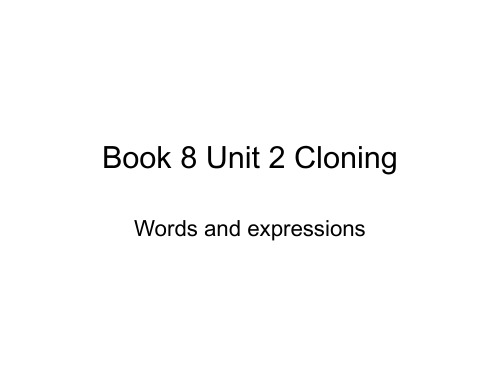
Some Chinese tourists are reported to
cast wrappings around at the airport.
cast a net cast a smile/ glance at cast doubt on/ upon sth cast aobtain vt. (formal) • obtain credits • obtain one’s degree in chemistry • Fresh vegetables and fruits used to be
difficult to obtain in Tibet. • You don’t say, you managed to obtain such
6. altogether adv. 总共;完全地;总而言之
• Giant Panda Meixiang gave birth to five babies altogether in the USA. in all/ total
• I was altogether absorbed in this interesting story at that moment. completely
13. owe vt. 欠(钱、账、债、人情等);归功于
owe sb sth = owe sth to sb
It occurred to me that I owed you 500 bucks.
With your help, I’ve obtained this important list. I _o_w_e__y_o_u_a__fa_v_o_r__ (欠你份人情).
• be opposed to (sb) doing sth
新课标人教版选修八Book8 Unit2 Vocabulary

• 5 forbid vt. (forbade/forbad, forbidden) 禁止;反对 forbid sb. to do sth. 禁止某人做某事 forbid doing sth. 禁止做某事 ①学校不允许学生吸烟。 • The school forbids students to smoke. ②老师严禁带手机到教室。 The teacher forbids carrying cellphones to the classroom. • 6 owe sb. sth.=owe sth. to sb.欠某人某物 • owe sb. sth. for...因某物欠某人的钱 • owe sb. sth.=owe sth. to sb.欠某人某物;把……归功于…… • owing to由于 • (1)I owed the garage $20 for the new tyre. 因那个新轮胎我欠汽 车修理厂20美元。 • (2) He owed his success to hard work and practice. 他把他的成 功归功于努力工作和实践 • (3)你欠我一个微笑。 • He owed me a smile./ He owed a smile to me. • (4)他把成功归功于母亲。He owed his success to his mother. • (5)This accident was owing to (由于)his careless driving.
The two buildings differ from each other in style.
• • ②你想通过成为志愿者的方式来作出贡献吗?(起作用)---by means of/ make a difference • 2 pay off得到好结果;取得成功;偿清 • ①They ____________ their debt after ten years 十年后他们还清了债务。 paid off paid off • ②They took a risk but it ____________. 他们冒了很大的风险,但事情成功 了 • pay 其他短语: • 付……的钱;为……而付出代价 pay for 偿付;报答;向……报复 • pay back 访问 pay a visit to
新人教选修8-Unit2-Words-and-phrases

that question.
(2) The two nations differ _in_ culture and religion.
(3)His parents f_o_r_b_id__h_i_m__to__d_r_in_k__w_i.ne 他的父母不准他喝酒。
Smoking should be forbidden in public places.
公共场所应禁止吸烟。
Her father forbid her to go out alone.
music n musician n 音乐家
He is a talented musician. 他是一个有天赋的音乐家。
differ v ①不同②意见相左
. differ with sb. on/about /over sth. . differ in…
. A differ from B
different adj be different from difference n make a/no difference
(6)I _o__w_e__ it to you that I finished my work
in time. 多亏你帮忙,我才及时完成了工作。
(7)__O__w__in__g_ to the rain, they could not come.
由于下雨,他们不能来了。
15. retire vi. ①退休 ②离开
object n.宾语,物体
objective adj.真实的,客观 的,无偏见的
选修8 Unit2 知识点
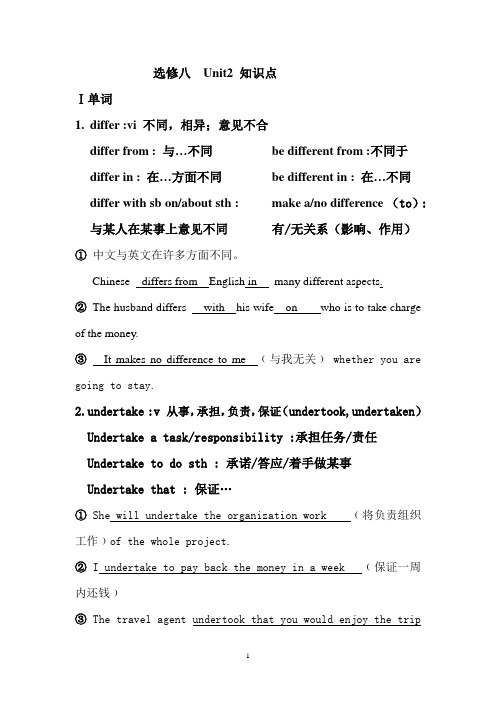
选修八Unit2 知识点Ⅰ单词1.differ :vi 不同,相异;意见不合differ from : 与…不同differ in : 在…方面不同differ with sb on/about sth :与某人在某事上意见不同be different from :不同于be different in : 在…不同make a/no difference (to): 有/无关系(影响、作用)①中文与英文在许多方面不同。
Chinese differs from English in many different aspects.②The husband differs with his wife on who is to take charge of the money.③It makes no difference to me ﹙与我无关﹚ whether you are going to stay.2.undertake :v 从事,承担,负责,保证(undertook,undertaken)Undertake a task/responsibility :承担任务/责任Undertake to do sth : 承诺/答应/着手做某事Undertake that : 保证…① She will undertake the organization work ﹙将负责组织工作﹚of the whole project.② I undertake to pay back the money in a week﹙保证一周内还钱﹚③ The travel agent undertook that you would enjoy the trip﹙保证你会喜欢这次旅行﹚.3 object :vi 反对;不赞成,抗议N 物体,目标,对象Objection :n 不赞成,反对,异议 Objective :adj 客观的;基于事实的Object to sb/sth :反对,抗议…Object that :抗议…Have an/no objection to (doing) sth : (不)反对…Raise a storm of objections :引起一阵强烈的反对There is no objection to sth :没设么不可以的①犀利哥是同情的对象。
选修8unit2词汇讲解

②while 作从属连词,意为“虽然,尽管”,表示让步关系。
Think about how they differ.(教材P 10)想一想他们如何不同。
be good friends with one ano ther.②make a differe nee有影响,很重要the differe nee betwee n A and BThe Un ited Nati ons was suppo sed to un dertake the respon sibility for global p eacekee ping.③ ............................................................. be differe nt from ... 在方面不同于某人①un dertake a task/res pon sibility承担任务/责任 undertake to do sth.6. pay off 得到好结果;取得成功;偿清exactly adv.确切地;究竟;至U 底to be exact 确切地说(=exactly speaking)But at last the determ in atio n and p atie nee of the scie ntists p aid off in 1996 withnot exactly 不完全;一点也不;根本不同位语从句可由 when, where , how, why , that , whether 等词引导。
同位语从句一般放在 idea ,具体内容。
有时为了保持句子的平衡,同位语从句还可以放在动词的后面。
7. Then came the disturbing news that Dolly had become seriously ill.((2013 •浙江高考 )The only way to succeed at the highest level is to have total belief本句是一个完全倒装句。
高二英语选修8unit2单词知识点

高二英语选修8unit2单词知识点Unit 2: Vocabulary Points in English Elective 8 (1000 words)In Unit 2 of the English Elective 8 course for high school sophomores, we will explore various essential vocabulary points. This unit aims to improve students' language proficiency by expanding their vocabulary and enriching their understanding of different word forms, meanings, and usage. Let's delve into the key vocabulary points covered in this unit.1. Synonyms and Antonyms:Synonyms are words that share similar meanings, while antonyms are words with opposite meanings. Understanding synonyms and antonyms helps students develop a broader range of vocabulary and enhances their language precision.For example:- Synonyms: happy, joyful, delighted- Antonyms: sad, miserable, gloomy2. Word Formation:Word formation focuses on the process of creating new words or deriving different word forms from a base word. This knowledge enables students to comprehend unfamiliar words and construct sentences effectively.Examples of word formation include:- Noun formation: happiness (from happy), musician (from music) - Verb formation: beautify (from beautiful), simplify (from simple)- Adjective formation: beautiful (from beauty), intelligent (from intelligence)3. Collocations:Collocations are word combinations that frequently occur together, forming a natural and idiomatic expression. Knowledge of collocations assists students in forming coherent sentences and using words in their appropriate context.Examples of collocations:- Make a decision: She made a difficult decision.- Take a chance: He decided to take a chance and pursue his dreams.4. Idioms and Phrasal Verbs:Idioms and phrasal verbs are essential parts of English language proficiency. Understanding idiomatic expressions and the usage of phrasal verbs helps students communicate more naturally and fluently in English.Examples of idioms and phrasal verbs:- Idiom: It's raining cats and dogs.- Phrasal verb: Give up (meaning: to stop doing something)5. Contextual Usage:Discussing how words are used in various contexts provides students with a deeper understanding of vocabulary. Analyzing words in different sentences and usage scenarios enhances their language comprehension and enables effective communication.Example:The word "run":- I usually run in the morning for exercise.- He managed to run the company successfully.6. Word Families:Exploring word families involves understanding the relationships between words derived from a common root. It includes nouns, verbs, adjectives, and adverbs with related meanings.Example:Root word: Love- Noun: love- Verb: love, love- Adjective: loving- Adverb: lovinglyIn conclusion, Unit 2 of the English Elective 8 course provides students with a comprehensive understanding of essential vocabulary points. By familiarizing themselves with synonyms, antonyms, word formation, collocations, idioms, phrasal verbs, contextual usage, and word families, students can significantly enhance their language skills. Through regular practice and application, students will develop strong vocabulary skills that contribute to their overall English language proficiency.。
选修八unit 2words

对于如何解决问题, 我跟他的意见不一致。 They differ with each other on moral s: • 用介词 from, with, on, about, upon 或 in 填空。 from/with him _________ on/about/ • (1) We differ _________ over _____ that question. in • (2) The two nations differ ______ culture • and religion. from • (3) The climate here differ ___________ • that of the South. • difference n.差异, 差别, 分歧, 争论, 差额 • different adj.不同的
Unit 2 Cloning
Words and expressions
1. differ vi. In pairs, look at these pictures and
discuss which ones are natural clones and which ones are man-make. Explain how they differ.
在某方面不同,有区别
3). sb. differ with sb. on/about/over sth.; (就某事)(与某人)持不同看法
Her method doesn’t differ much from mine.
她的方法跟我的没有很大不同。 Modern airplanes differ from early ones. 现代飞机跟早期的在很多方面有所不同。 I differ with him on how to solve the problem.
Unit 2 词汇课件-2021-2022学年高中英语人教新课标选修八

用于pay off sth 或 pay sth off结构。 通常接account, debt, loan等作宾语。
2. He studied hard before the examination, and it paid off. He
made an A.
取得成功;得到好结果 vi
用于sth pays off 结构。通常用effort, hard work, persistence等作主语。
失去兴趣
12. The boys started to switch off after the first speech.
13. The effects of the drug began to wear off. 逐渐消失
缩合词
telecast = television + (broad)cast 电视广播
newscast = news + (broad)cast 新闻广播 sportscast / sportcast = sport + (broad)cast 体育节目
单词 cast 的基本义是“扔、投掷”,衍生出了大量衍生义,如 “浇铸”(把融化的铁水“扔”到模具里)、“钓鱼”(把钓钩“扔” 出去)、“计算、加”(扔石子来计算)、“演员阵容”(把演员“扔” 到舞台上)。词组习语:cast a glance (一瞥);cast an actor in a play (为某戏剧选演员);cast a movie (为电影选角);casting director (选 角导演);cast sb as (将某人描绘为)。
人教⑧ – 2
③ forbid (sb) doing sth:
The regulations forbid smoking in this room.
人教版高中英语选修八Unit2知识点梳理(原创)
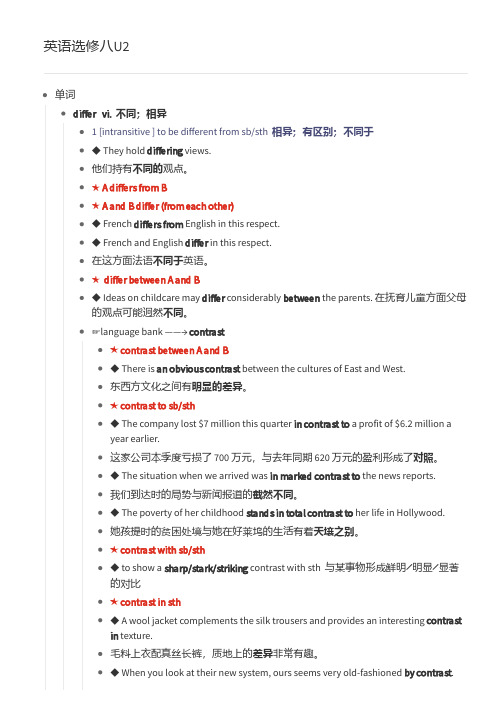
单词 differ vi. 不同;相异 1 [intransitive ] to be different from sb/sth 相异;有区别;不同于 ◆ They hold differing views. 他们持有不同的观点。 ★ A differs from B ★ A and B differ (from each other) ◆ French differs from English in this respect. ◆ French and English differ in this respect. 在这方面法语不同于英语。 ★ differ between A and B ◆ Ideas on childcare may differ considerably between the parents. 在抚育儿童方面父母 的观点可能迥然不同。 ☞language bank ——→ contrast ★ contrast between A and B ◆ There is an obvious contrast between the cultures of East and West. 东西方文化之间有明显的差异。 ★ contrast to sb/sth ◆ The company lost $7 million this quarter in contrast to a profit of $6.2 million a year earlier. 这家公司本季度亏损了 700 万元,与去年同期 620 万元的盈利形成了对照。 ◆ The situation when we arrived was in marked contrast to the news reports. 我们到达时的局势与新闻报道的截然不同。 ◆ The poverty of her childhood stands in total contrast to her life in Hollywood. 她孩提时的贫困处境与她在好莱坞的生活有着天壤之别。 ★ contrast with sb/sth ◆ to show a sharp/stark/striking contrast with sth 与某事物形成鲜明╱明显╱显著 的对比 ★ contrast in sth ◆ A wool jacket complements the silk trousers and provides an interesting contrast in texture. 毛料上衣配真丝长裤,质地上的差异非常有趣。 ◆ When you look at their new system, ours seems very old-fashioned by contrast.
人教版选修八单词(unit2)按词性分类版(带音标)
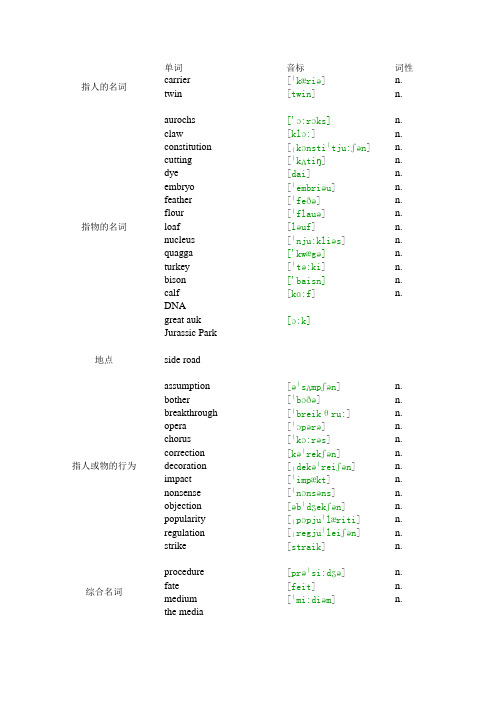
地点 指人或物的行为
综合名词
单词 carrier twin
aurochs claw constitution cutting dye embryo feather flour loaf nucleus quagga turkey bison calf DNA great auk Jurassic Park
旁路;支线;岔道(美sidewalk)
假定;设想 烦扰 突破 歌剧;歌剧团;歌剧院 合唱;合唱队 改正;纠正;修正 装饰 撞击;冲击;巨大的影响 胡说;无稽之谈;废话 不赞成;反对;异议 受人喜爱;流行 规则;规章;法规 罢工
程序;步骤;手续 命运;天命 媒介;手段;工具 大众传播媒体(电视、报纸等)
['baisn]
n.
[kɑ:f]
n.
[ɔ:k]
[əˈsʌmpʃən]
n.
[ˈbɔðə]
n.
[ˈbreikθru:]
n.
[ˈɔpərə]
n.
[ˈkɔ:rəs]
n.
[kəˈrekʃən]
n.
[ˌdekəˈreiʃən]
n.
[ˈimpækt]
n.
[ˈnɔnsəns]
n.
[əbˈdʒekʃən]
n.
[ˌpɔpjuˈlæriti]
vt.
cast (cast, cast)
[kɑ:st]
vt.
dye
[dai]
vt.
forbid(forbade,forbidden) [fəˈbid]
vt.
hatch
[hætʃ]
vt.
指人或物之间发生了什么 obtain
[əbˈtein]
高中英语选修8unit2重点单词
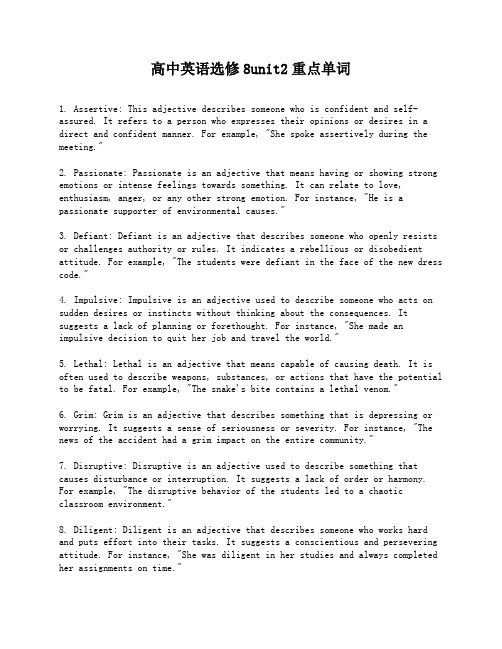
高中英语选修8unit2重点单词1. Assertive: This adjective describes someone who is confident and self-assured. It refers to a person who expresses their opinions or desires in a direct and confident manner. For example, "She spoke assertively during the meeting."2. Passionate: Passionate is an adjective that means having or showing strong emotions or intense feelings towards something. It can relate to love, enthusiasm, anger, or any other strong emotion. For instance, "He is a passionate supporter of environmental causes."3. Defiant: Defiant is an adjective that describes someone who openly resists or challenges authority or rules. It indicates a rebellious or disobedient attitude. For example, "The students were defiant in the face of the new dress code."4. Impulsive: Impulsive is an adjective used to describe someone who acts on sudden desires or instincts without thinking about the consequences. It suggests a lack of planning or forethought. For instance, "She made an impulsive decision to quit her job and travel the world."5. Lethal: Lethal is an adjective that means capable of causing death. It is often used to describe weapons, substances, or actions that have the potential to be fatal. For example, "The snake's bite contains a lethal venom."6. Grim: Grim is an adjective that describes something that is depressing or worrying. It suggests a sense of seriousness or severity. For instance, "The news of the accident had a grim impact on the entire community."7. Disruptive: Disruptive is an adjective used to describe something that causes disturbance or interruption. It suggests a lack of order or harmony. For example, "The disruptive behavior of the students led to a chaotic classroom environment."8. Diligent: Diligent is an adjective that describes someone who works hard and puts effort into their tasks. It suggests a conscientious and persevering attitude. For instance, "She was diligent in her studies and always completed her assignments on time."9. Remorseful: Remorseful is an adjective that describes someone who feels regret or guilt for their actions. It suggests a sense of remorse or repentance. For example, "He was remorseful after realizing the negative impact of his words."10. Candid: Candid is an adjective used to describe someone who is honest and straightforward in expressing their thoughts or opinions. It suggestssincerity and openness. For instance, "She gave a candid response to the interviewer's question."11. Resilient: Resilient is an adjective that describes someone or something that has the ability to recover quickly from difficulties or hardships. It suggests adaptability and strength. For example, "Despite facing numerous challenges, she remained resilient and continued to pursue her goals."12. Inevitable: Inevitable is an adjective that means certain to happen; unavoidable. It suggests that something is bound to occur or cannot be prevented. For instance, "Conflict is inevitable in any relationship."13. Vicious: Vicious is an adjective used to describe something that is cruel or violent. It suggests a destructive or harmful nature. For example, "The dog launched a vicious attack on the intruder."14. Competent: Competent is an adjective that describes someone who has the necessary skills, knowledge, or qualifications to perform a task successfully. It suggests capability and proficiency. For instance, "She is a competent pianist who has won several awards."15. Ruthless: Ruthless is an adjective used to describe someone who shows no pity or compassion. It suggests a lack of mercy or remorse. For example, "The ruthless dictator suppressed any opposition to his rule."16. Efficient: Efficient is an adjective that describes someone or something that is able to achieve a task with the least amount of time, money, or effort wasted. It suggests effectiveness and productivity. For instance, "She managed to complete the project efficiently, meeting all the deadlines."17. Lively: Lively is an adjective that describes something that is full of energy and excitement. It can refer to a place, event, or person that is vibrant and engaging. For example, "The party was lively with music and dancing."18. Adaptable: Adaptable is an adjective that describes someone or something that can easily adjust to new situations or changes. It suggests flexibility and resilience. For instance, "She has an adaptable personality, which allows her to thrive in different environments."19. Reliable: Reliable is an adjective that describes someone or somethingthat can be trusted to perform a task correctly or consistently. It suggests dependability and consistency. For example, "He is a reliable friend who always comes through in times of need."20. Zealous: Zealous is an adjective that describes someone who is very enthusiastic and passionate about a particular cause, activity, or belief. It suggests a strong dedication and commitment. For instance, "She is a zealous advocate for animal rights."21. Respectful: Respectful is an adjective that describes someone who shows polite and courteous behavior towards others. It suggests a sense of honor and consideration. For example, "He was respectful of his elders and always treated them with kindness."22. Unpredictable: Unpredictable is an adjective that describes something that cannot be foreseen or predicted. It suggests the lack of consistency or pattern. For instance, "The weather in this region is often unpredictable, with sudden changes in temperature and rainfall."23. Miserable: Miserable is an adjective that describes a state of great unhappiness, discomfort, or pain. It suggests a low level of satisfaction or well-being. For example, "She felt miserable due to the constant rain and cold weather."24. Generous: Generous is an adjective that describes someone who is willing to give more of their time, money, or resources than is strictly necessary or expected. It suggests a spirit of kindness and selflessness. For instance, "He was generous enough to share his lunch with the homeless man."25. Tenacious: Tenacious is an adjective that describes someone who is very determined and does not give up easily. It suggests a strong will and perseverance. For example, "She was tenacious in her pursuit of success, never letting obstacles deter her."。
人教版选修八UNIT2重点单词及词组权威例句汇总
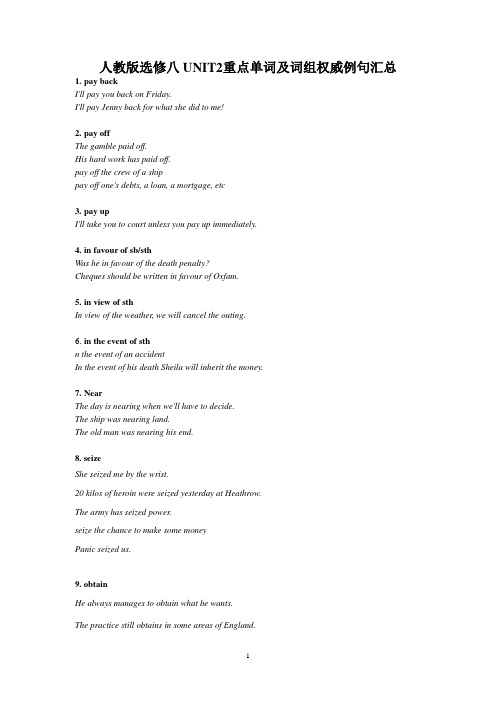
人教版选修八UNIT2重点单词及词组权威例句汇总1.pay backI'll pay you back on Friday.I'll pay Jenny back for what she did to me!2.pay offThe gamble paid off.His hard work has paid off.pay off the crew of a shippay off one's debts, a loan, a mortgage, etc3.pay upI'll take you to court unless you pay up immediately.4.in favour of sb/sthWas he in favour of the death penalty?Cheques should be written in favour of Oxfam.5.in view of sthIn view of the weather, we will cancel the outing.6.in the event of sthn the event of an accidentIn the event of his death Sheila will inherit the money.7.NearThe day is nearing when we'll have to decide.The ship was nearing land.The old man was nearing his end.8. seizeShe seized me by the wrist.20 kilos of heroin were seized yesterday at Heathrow.The army has seized power.seize the chance to make some moneyPanic seized us.9. obtainHe always manages to obtain what he wants.The practice still obtains in some areas of England.10. before long; long beforeI hope to see you before long.没过多久I saw the film long before.很久以前11.soon after (sb/sth)He arrived soon after three.They left soon after we did.I rang for a taxi and it arrived soon after.12. shortly afterShe arrived shortly after us.13.get through sthShe gets through forty cigarettes a day.Let's start; there's a lot of work to get through/to be got through.Tom failed but his sister got through.Do you think the Bill will get through (Parliament)?14.get acrossThe bridge was destroyed so we couldn't get across the river.15.there's no getting away from sth; one can't get away from sthThere's no getting away from the fact that the country's economy is suffering.16.get overI think the problem can be got over without too much difficulty.He was disappointed at not getting the job, but he'll get over it.She didn't really get her meaning over to her audience.She'll be glad to get the exam over (and done) with.17.cast sb downHe is not easily cast down.18.cast (sth) offShe's cast off three boy-friends in a month.。
高二英语选修8 Unit2 words

1234567
Why do some people object to human cloning? 为什么一些人反对克隆人类呢? I object to you/your going there alone. 我反对你一个人去那里。
The truth cast him down. 真相让他很沮丧。
1234567
cast down 使沮丧;放低,垂下 cast off 抛弃,摆脱掉 cast away 扔掉;放弃;浪费
阅读下面的句子,指出cast的词性及含义 The little boy cast a little stone into the pond. 这小男孩向池塘里扔了一个石子。 词性 动词 含义 投,扔,掷
这是癌症研究中的重要突破。
Scientists think they are beginning to break through in the fight against cancer.
短语 break through 意义 取得突破,做出重大发现
1234567
5.cast down 使失望;使沮丧 Karl was much cast down by his failure in the exam. 卡尔因未通过考试而十分沮丧。
He obtained a large sum of money by/through buying and selling houses.
他通过买卖房子赚了一大笔钱。
1234567
obtain...from...从……处获得…… obtain...for...为……获得/赢得 obtain with 为……所公认
英语选修8 unit2 词汇英译汉及课文翻译
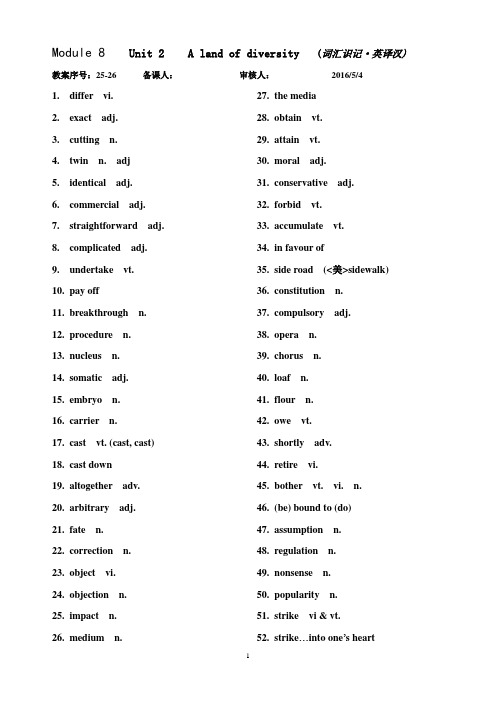
Module 8Unit 2 A land of diversity (词汇识记·英译汉)教案序号:25-26 备课人:审核人:2016/5/41.differ vi.2.exact adj.3.cutting n.4.twin n. adj5.identical adj.mercial adj.7.straightforward adj.plicated adj.9.undertake vt.10.pay off11.breakthrough n.12.procedure n.13.nucleus n.14.somatic adj.15.embryo n.16.carrier n.17.cast vt. (cast, cast)18.cast down19.altogether adv.20.arbitrary adj.21.fate n.22.correction n.23.object vi.24.objection n.25.impact n.26.medium n. 27.the media28.obtain vt.29.attain vt.30.moral adj.31.conservative adj.32.forbid vt.33.accumulate vt.34.in favour of35.side road (<美>sidewalk)36.constitution n.pulsory adj.38.opera n.39.chorus n.40.loaf n.41.flour n.42.owe vt.43.shortly adv.44.retire vi.45.bother vt. vi. n.46.(be) bound to (do)47.assumption n.48.regulation n.49.nonsense n.50.popularity n.51.strike vi & vt.52.strike…into one’s heart班级53.bison n.54.calf n.55.from time to time56.bring back to life57.initial adj.58.vain adj.59.in vain60.resist vt.61.drawback n.62.merely adv.63.restore vt.姓名64.decoration n.65.unable adj.66.feather n.67.fairly adv.68.in good/poor condition69.turkey n.70.dye vt. n.71.claw n.72.adore vt.73.hatch vt. & vi.74.reasonable adj.选修8 Unit 2 课文对照翻译Reading One克隆:它将把我们引向何方?克隆一直与我们同在,而且它还要持续下去。
- 1、下载文档前请自行甄别文档内容的完整性,平台不提供额外的编辑、内容补充、找答案等附加服务。
- 2、"仅部分预览"的文档,不可在线预览部分如存在完整性等问题,可反馈申请退款(可完整预览的文档不适用该条件!)。
- 3、如文档侵犯您的权益,请联系客服反馈,我们会尽快为您处理(人工客服工作时间:9:00-18:30)。
3). sb. differ with sb. on/about/over sth.; (就某事)(与某人)持不同看法
Her method doesn’t differ much from mine.
她的方法跟我的没有很大不同。 Modern airplanes differ from early ones. 现代飞机跟早期的在很多方面有所不同。 I differ with him on how to solve the problem.
两人一组, 观察图片并讨论哪些是自然无性 繁殖, 哪些是人工的。解释它们的区别。
differ是不及物动词, 主要有两个义项:“不
同;不同意, 意见相左”。常见的搭配有: 1). A and B differ (from each other) in… ; 2). A differs from B in …
8. object to 反对;不同意 object to sb/sth 反对/不赞成某人某事 object to doing sth 反对做某事 object to sb doing sth 反对某人做某事 have/make an objection to (doing) sth
对表示反对 学生反对被像孩子似的对待。 The students objected to being treated like children. 我们因为一个人的错误反对惩罚整个班级。 We ~ to punishing the whole class for one’s mistake. 我们不赞成和他们合作. (objection) We have/make an objection to teaming up with them
13. in favour of 赞成;有利于与against相对。
他赞成这项计划吗?
Is he in favour of the plan? 拓展:
In sb’s favor 对某人有利 do sb a favor =do a favor for sb In favor with sb. 受某人支持 目前她没有得到媒体的捧场
• 她的父亲禁止她喝酒。 • Her father forbids her to drink wine. • 法律禁止在这块土地上建筑。 The law forbids building on this land. My doctor has forbidden me sugar. 医生禁止我吃糖 He forbade them from mentioning the subject again. 他不准他们再提到这个话题
•他许诺当我们的向导.
•He undertook to be our guide . 他答应十点到这里. He undertook to be here at 10:00.
• 我不能保证我能按时做完它. • I can’t undertake that I ‘ll finish it in time .
帮某人忙做
At present she’s not in favor with the media. 今天你能帮个忙去学校接迈克吗?
Could you do me a favor to pick up Mike from school?
The exchange rate is in our favor at the moment.
11. forbid vt.禁止,不准,不许 • forbade /forbad, forbidden, forbidding
sth. sb. sth. doing sth. sb. from doing sth sb. to do sth. that…
forbid
• 公共场所应禁止吸烟。
Smoking should be forbidden in public places. 我不准你告诉任何人 I forbid you to tell anyone.
16.retire vi. 退休,离开 用法:retire (from sth.)/retire (as sth.)
She had to retire from teaching because of ill health. He has no plan to retire as editor of the magazine. 他还不打算从杂志编辑的位子上退下来
15.shortly adv. 立刻,不久
shortly after 之后不久 shortly before 之前不久 She arrived shortly after us. 我们刚到不多会她就到了。 I saw him shortly before he died. 在他去世前不久我见过他一面。
•即时练习: •完成下列句子 •(1) The school forbids the students to smoke _________________________ (禁止学生吸烟). enter the room •(2) He is forbidden to _______________ (进 入这个房间).
attain freedom/our targets They are not likely to attain this aim. 他们未必能够达到这一目标。 If you would attain greatness, think no little thoughts. 如果你想成就伟大,就不要有任何渺小思想。 Mr smith attain the position of minister. 史密斯先生获得了部长的地位。
14. Owe v. 用法:owe sb. sth./owe sth. to sb. 1)欠(钱) She still owes her father $3000. She still owes $3000 to her father. 2)欠(情);感激 You owe me a favour. We owe a lot to our parentsቤተ መጻሕፍቲ ባይዱ I think you owe us an explanation. 我认为你应当给我们一个解释 3)归功于,起源于 He owes his success to hard work. owing to 由于
• cast away丢弃, 抛弃, 使失事, 使漂流 • cast off 放弃;丢弃, 摆脱 • cast out赶走, 驱逐
• • • • • •
5. Altogether Dolly lived for six years, … altogether adv. ①全部,总共 你一共欠我68美元 You owe me $68 altogether. ②总而言之 总之,我们的成就是巨大的。 Altogether, our achievements are great. • ③完全地(completely) • 他并不完全确信接下去做什么。 •He’s not altogether sure what to do next.
• 即时练习:完成下列句子。 undertake a journey next • (1) He will ___________________
month (去旅行).
undertook a new task • (2) He ______________________ (承担了一
项新任务).
4. cast down:feeling unhappy and depressed 使沮丧, 低沉, 使下降, 推翻 • be cast down = feel discouraged
2. identical
1)一模一样的,相同的
The two pictures are similar, although not identical. Her dress is almost identical to/with mine. be identical to/with… 与· · · 一样 2)同一的 用于the identical, 相当于 the same This is the identical room I stayed in last year. 这就是我们去年住的那个房间
对于如何解决问题, 我跟他的意见不一致。 They differ with each other on moral standards.
关于道德标准, 他们的见解不同。
• 即时练习: • 用介词 from, with, on, about, upon 或 in 填空。 from/with him _________ on/about/ • (1) We differ _________ over _____ that question. in • (2) The two nations differ ______ culture • and religion. from • (3) The climate here differ ___________ • that of the South. • difference n.差异, 差别, 分歧, 争论, 差额 • different adj.不同的
Unit 2 Cloning
Words and expressions
1. differ vi. In pairs, look at these pictures and
discuss which ones are natural clones and which ones are man-make. Explain how they differ.
2. undertake vt.实施,从事,着手做,承担, 担任, 许诺, 保证,采取,答应
undertake sth 承担某事 ~ a task/ project 承担一个任务/项目 undertake to do sth 许诺做某事/ 同意做某事 undertake that … 保证…
